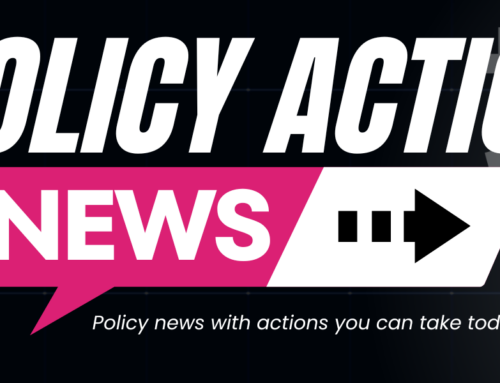August 29, 2019: PWN-USA members and staff will be at USCA in Washington, D.C. representing women living with HIV. We hope you will join us for some of these conversations and presentations.
Whether you are at USCA or at home, you can follow us on Twitter to get in on the conversation by using the hashtags #pwnspeaks #2019USCA. Here is where you will find us at USCA.
Wednesday, September 4
Black Women’s Health Imperative – Ending the Epidemic for Whom?
10:00 AM – 4:30 PM The summit will feature panels and discussions that will foster opportunities for open dialogue among health professionals, community leaders and care providers about strategies to address educational, treatment and other barriers that can be leveraged to improve health outcomes. Register here: https://ooot.bwhi.org/interactive-summit/
Thursday, September 5
PWN-USA Membership Meeting
9:00 AM – 11:00 AM Mt. Vernon Square Room, Marriot Marquis Calling all PWN members and leaders! The next couple of years will be busy and important for the future of our country and for our communities. Come hear about what PWN has planned for the next 2 years and opportunities to get involved!
The Future is Female: WoC Leadership in the HIV Movement
2:00 PM – 4:00 PM Silver Linden, 2nd Floor From the early years of the epidemic to the present, the HIV movement has been a formidable vehicle for change–largely due to the tireless efforts of cisgender and transgender women of color. It is often stated that we “stand upon the shoulders of giants,” and many of these giants have remained committed to laboring for the HIV movement. Yet, the importance of cultivating new leaders among women of color to work alongside current ones and eventually assume greater responsibility in the movement is paramount–especially as the demographic, needs, and perspectives of the HIV community continue to evolve.
This session will highlight factors relevant to acknowledging, supporting, and developing women of color as leaders in the HIV movement. Existing and aspiring leaders (cis and trans women of color) will discuss opportunities, challenges, and crucial issues as well as resources for helping emerging leaders, supporting youth leaders, and sustaining seasoned ones. Presenters are: Morenike Giwa Onaiwu, Women’s HIV Research Collaborative; Sandra Agola, ATN-YEAH, Dazon Dixon Diallo, SisterLove, Inc.; Naiymah Sanchez, WHRC; Holly Dakkus, HART/HPTN; Tana Pradia, Positive Women’s Network – USA; Valerie Rochester, Women’s HIV Research Collaborative/AIDS United; and Abigail Echo-Hawk, Urban Indian Health Initiative.
Friday, September 6
Honoring the Healing Power of Our Stories
9:00 AM – 11:00 AM LeDroit Park, Meeting Level 3 Between guiding stories shared by facilitators, participants will be given an opportunity to share a short part or version of their entire story with the intention to provide hope, constructive guidance, positive inspiration, helpful knowledge, or other positive experiences for those who hear their story.
After each sharing, open up to all in attendance (with facilitation and temperance provided by the facilitators) to give constructive feedback and encouragement on how to improve the telling of their tale, so as to emphasize their strengths, resiliency, benefits gained, and lessons learned in the process of living the tale. Presenters are: Waheedah Shabazz El, former PWN Organizing Director/Reunion Project; Jeff Taylor, Positive Life Series; Chris Barlett; Greg Cassins, Reunion Project; Louis Spraggins, Reunion Project; and Jeff Berry, T-PAN/Reunion Project.
Women’s Institute: Building a Women’s Culture of Wellness: From Trauma to Resiliency
9:00 AM – 11:00 AM Catholic University, Meeting Level 1 Trauma-informed care is an approach that recognizes the importance of engaging women vulnerable to or living with HIV with histories of trauma, recognizes the presence of trauma symptoms, and acknowledges the role that trauma has played in the lives of women.
This session will provide an overview of SAMHSA’s trauma-informed framework followed by a two-prong focus on 1) the impact of chronic intersectional trauma-the intersection of individual trauma-life experiences, overlapping community-based and intergenerational traumatic stressors – on women vulnerable or living with HIV; and 2) participants sharing experiences of how they support women vulnerable or living with HIV through their traumatic lived experiences. Presenter is Vanessa Johnson, former PWN Training Director/Ribbon Consulting Group.
Unpacking the U=U Basics: The Message and the Movement
2:00 PM – 4:00 PM Shaw, Meeting Level 3 The U=U campaign began in the U.S. as a struggle for truth rooted in the principle that all people living with HIV have a right to accurate and meaningful information about their sexual and reproductive health. It grew into a community-driven global movement accepted by the international scientific and medical community, and reaching every key affected population in nearly 100 countries – and growing.
In this workshop, you’ll hear the inside story of how it started from some of the founders of the movement, and you’ll gain tools and strategies to communicate this game-changing message in meaningful ways in your communications, clinical, and advocacy work. Presenters are: Murray Penner, Prevention Access Campaign; Brady Dale Morris, Nashville Regional HIV Planning Council; Davina Conner, PWN Colorado Co-chair/POZ Haven Foundation; Deondre Moore, AIDS Healthcare Foundation-Houston; Bryan C. Jones, Ursuline Piazza; and Alleen King-Carter, Living in 3-D.
2:00 PM – 4:00 PM University of D.C., Meeting Level 1 This workshop will educate participants about HIV and the criminalization of people living with HIV that is occurring domestically and globally. Knowledge of this issue coupled with other stigmatizing intersectionalities is what participants need in creating and building advocacy programs. The model of this session will be based off a coalition recently organized and two established movements as your key presenters which are – The Ending HIV Criminalization and Overincarceration in Virginia (ECHO VA), Florida HIV Justice Coalition, and the Georgia HIV Justice Coalition. Cedric Pulliam, ECHO VA; Deidre Johnson, PWN-VA State Lead/ECHO VA; Kamaria Laffrey, PWN member/The SERO Project; and Eric Paulk; Georgia Equality.
Ending the HIV Epidemic – A Community Based Approach
4:15 PM – 6:15 PM Georgetown, Meeting Level 1 This session will feature an interactive cross-community panel discussion with members of priority populations focused on ending the HIV epidemic within their communities. Panelists will discuss the respective needs of their communities and what is needed to align community-based prevention efforts with the President’s End the Epidemic plan. Panelists will also provide tools for attendees to engage their local stakeholders to ensure community involvement within local End the Epidemic or Getting to Zero plans.
Presenters are: Ernest Hopkins, NBGMAC; Guillermo Chacon, Latino Commission on AIDS; Naina Khanna, PWN-USA Executive Director; and Arianna Lint, Arianna Center.
Saturday, September 7
Strategies for Addressing Attacks on HIV Health Care
9:00 AM – 11:00 AM Archives, Meeting Level 4 To say the least, we are living in interesting and challenging times. This workshop will provide an overview of recent efforts by the Trump administration and Congress to undermine the Affordable Care Act and other important health reforms. It will describe several of the successes we have had fighting against dangerous proposals that threaten access to high-quality and affordable HIV care. Learn more about efforts to challenge this administration and Congress and how to participate in advocacy to protect and promote the health, rights, and dignity of people living with HIV.
Presenters are: Robert Greenwald, Center for Health Law and Policy Innovation; Aquarius Gilmer, Southern AIDS Coalition; and Naina Khanna, Positive Women’s Network – USA.
Adapting an Evidence-Based Intervention for Transgender Women with HIV
9:00 AM – 11:00 AM Marquis Salon 12, Meeting Level 2 The majority of HIV prevention interventions diffused by Centers for Disease Control and Prevention (CDC) are appropriate for adaptation for transgender (TG) women. Recently, the Women Involved in Living and Learning from Other Women (WILLOW) intervention was adapted for TG women and renamed Transgender Women Involved in Strategies for Transformation (TWIST). Three community-based organizations are piloting TWIST in two cities (Atlanta and Chicago).
Presenters are Arlene Edwards, CDC-Atlanta; Dana Williams, Community Wellness Project; Jamila Shipp, California Prostitute Education Project; Kelly Stevens, AIDS United; Tatyana Moatan, Howard Brown Health; Tori Cooper, Advocates for Better Care; Octavia Lewis, PWN Board Member; Nevaeh Anderson, The Empowerment Program; and Carmarion Anderson, Black Transwomen, Inc.
HIV 50+: Mini-Grants
9:00 AM – 11:00 AM Marquis Salon 13, Meeting Level 2 NMAC has invited five past scholars to present on their mini-grant/internship projects and highlight their successes and challenges with executing the project in their community. Lillibeth Gonzalez, PWN member, will be presenting about her Thriving at 50 & Beyond group, including the topics discussed, the activities held and the end results. Bryan C Jones and Michelle Jackson Rollins will present on the Sankofa Retreat, a 2-day intergenerational retreat that paired an experienced PLWHA over 50 years old with a young PLWHIV. Jared Hafen will present on the Positive Force Reunion, which is a social support group for people over 50 living with HIV. Janice Shirley will present on her “Thriving at 50” project and how her clients have been able to use the information they learned during their sessions.
CRI Purple Removing the Bandages of Women Living with HIV
9:00 AM – 11:00 AM Howard, Meeting Level 1 This workshop focuses on the stories of four women living with HIV and their experience and perseverance in overcoming intimate partner and domestic violence. The trauma of violence impacts women living with HIV in their health and safe disclosure of serostatus. Additionally, criminalization keeps women in domestic violence situations. Removing the bandages means understanding the power of personal testimony for healing and taking brave steps to find support and resources.
Presenters are: Kneeshe Parkinson, PWN Missouri State Lead; Alecia Tramel, PWN Florida State Lead; Shelia Crockett, PWN Texas-DFW Co-chair; and Olga Irwin, PWN member.
Voter Suppression Meets Viral Suppression
2:00 PM – 4:00 PM Mount Vernon Square, Meeting Level 3 The intersection of identities that many people living with HIV/AIDS fall into are often subjected to difficulty in ways that no one should be subjected to. Furthermore, difficulties from lack of housing to lack of transportation leave people living with HIV/AIDS with more barriers to voting. Their power in the voting booth directly impacts these difficulties which further compounds them. The goal of viral suppression only becomes that much more difficult when partnered with voter suppression.
Presenters are: KJ Smith; Lisa Johnson-Lett, PWN Board member; and Janine Brignola, PWN member.
Community Event: Should Undetectable People Disclose their Status?
4:15 PM – 6:15 PM LeDroit Park, Meeting Level 3 Is disclosure to sex partners still necessary by those who are undetectable, now that science has proven that people living with HIV on effective treatment who are undetectable cannot sexually transmit HIV? How do personal ethics, practical considerations, and sexual context play a role in your decision? Join facilitators Mark S. King (My Fabulous Disease) and Waheedah Shabazz-El (retired PWN Organizing Director) for a dynamic discussion that welcomes the views of everyone, HIV-positive and HIV-negative alike.
Sunday, September 8
Connecting the Dots: Uprooting Social Determinants and HIV
9:00 AM – 11:00 AM Congress, Meeting Level 4 Research shows that behavioral and social determinants directly affect health outcomes and impact an individual’s risk of acquiring HIV. This panel will address how those structural interventions exist at the nexus of HIV and criminalization. This panel addresses how structural interventions can be used to target the social determinants of HIV transmission: Public health buy in; syringe exchange programs; comprehensive sex-ed; and decriminalize sex work.
Presenters are: Kate D’Adamo, Reframe Health and Justice; Breanna Diaz, PWN-USA Policy Director; Drew Gibson, AIDS United; and Jada Hicks, The Center for HIV Law and Policy.
pwnusa2019-09-03T14:06:16-04:00August 29th, 2019|Uncategorized|Comments Off on Will You Be at USCA? PWN Will Be. Here’s Where to Find Us!




